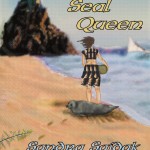As every author knows, sometimes a book just grabs you and yells, “Drop what you’re doing and write me!”
That’s how it was with The Seal Queen. I was on vacation in Capitola, CA, sitting on a beach, staring at the waves and hoping for inspiration for a novel set in prehistoric time.
Instead, I was overcome by the magic of the place. How easy it was to just stare at the waves. How invigorating the smell of salt and living things was. How it felt, sitting on the western edge of North America, gazing across the largest ocean in the world. More than anything, how safe I felt.
The word “sanctuary” came to mind. A story began to form of a young woman on the run from something bad, finding safety in a place like this. Next came practical considerations: how would she survive alone? Just behind me was a small cave. On the sand around me were the remains of countless shellfish. And in the water in front of me (I could only assume) were fish. There was driftwood, for a fire to warm her little cave. Everything she needed was right there. Clothes? That might be a challenge—but that only made the idea more appealing.
I began with what I thought was going to be a straightforward, prehistoric adventure story, but I quickly discovered something was missing. Other characters, perhaps, but I knew right away they could not be human characters. The beach was full of magic and mystery, and so was the story. My heroine’s friends needed to be creatures of the sea. And I sensed she already had some kind of connection to them, even if she didn’t yet know it.
I had not written much fantasy, although I loved to read it. I decided the best way for me to approach the fantasy element of the story was to delve into what I was already comfortable with: mythology and folklore. I knew a bit about selkies, so I started there. When I discovered the roane, the novel just took off, and pretty much wrote itself from there.
Excerpt from The Seal Queen
She awoke to impossibly bright sunshine. Water was lapping gently against one arm. From above came the raucous cry of gulls. Briah sat up suddenly.
She was on a wide, sandy beach. The coast stretched east and west, as far as she could see. Behind her were gray cliffs of varying height and depth. Before her the sea stretched. And kept on stretching. Briah would have gladly just sat there and stared at the endless rocking waves, but they were getting closer to her with each pulsing motion. She backed up until she reached the cliff, frightened, as she realized there was no way through them, and climbing was out of the question.
Briah calmed when she realized that the base of the cliff was interwoven with plants and nests, none of which would be there if the waves reached this far back. So she found a comfortable rock dappled with shade and sun, and sat down to see where she was.
Puffy white clouds sailed lazily across a vivid blue sky. There was no sign anywhere of human habitation. It took a while for this fact to sink in. Briah, as far as she knew, had never been alone in her life. For a long time, that was a good thing; a fact she never questioned. But on a harvest morning four years ago, all of that changed forever. Since then, she had known friendship and comfort, but most of the time, people had meant pain and fear. And always, they had been in control of her.
But now, there was no one except her. And as Briah turned around to examine the tunnel she had come through during the night, she saw it was gone. Water filled it. Only at low tide could this place be reached at all.
Briah was alone. And it seemed just barely possible that she might stay that way.
Suddenly, it seemed, a great weight rolled off her shoulders. She breathed a little deeper; exhaled a little louder.
“I’m free,” she said softly, testing the words. When nothing happened, Briah said them again, louder this time. The only answer was the monotonous roar of the surf and the raucous cries of gulls.
Briah leaped to her feet, graceful in spite of her awkward bulk. She pulled her sodden, sand filled clothes from her body and threw them into the rocks behind her, not caring that cold stung her body. Naked and bulging, Briah danced into the shallow waves. Cold water tickled her feet and sucked at her legs. It felt wonderful.
“I’m free! I’m safe! And I’m going to live!” It was madness, she knew. Even if there was no other access to this beach; even if no one else ever breached the tunnel’s secret, there was no reason to believe that a lone woman could survive here. And one about to give birth had even less reason to hope.
Yet Briah hoped. She sang. She soared.
It was only cold and thirst that made her stop. She gathered up her clothes, but did not put them back on.
She walked toward the west, since the going was smoother and less rocky that way.
She had not gone far when she came to a thin ribbon of fresh water. It bubbled down from the cliffs, ran across the beach, and then merged with the salt water of the sea. Briah drank her fill. Then, hanging her clothes and boots on some of the rocks that jutted into the surf, she beat them with some smooth rocks she found in the sand. Next, she carried them back toward the cliff, where the freshwater danced and dropped in small cascades. Rinsing the laundry was not easy, for space was cramped, and conditions were not designed for bare feet.
But at last, Briah was satisfied. She wrung out the clothes and spread them to dry at the base of the cliff, where the sun shone fully. After weighting them down with rocks, Briah decided to explore further. But not without clothes. The late autumn cold had finally penetrated her euphoria. With nearly numb fingers, she untied her bundle, and wrapped herself in the drier of the two blankets. Stowing the few remaining scraps of food and her flints in the other blanket, Briah picked up her one knife and headed down the beach.
The shore was rocky, so she stayed near the surf, where the sand was gentle on her bare feet. Without realizing it, Briah began to walk in step with the surge and slap of the waves. She felt a sense of peace she had never before known. Perhaps that was what gave her the courage to keep walking in this strange place, looking for who knew what.
______________
 Sandra Saidak graduated San Francisco State University in 1985 with a B.A. in English. She is a high school English teacher by day, author by night. Her hobbies include reading, dancing, attending science fiction conventions, researching prehistory, and maintaining an active fantasy life (but she warns that this last one could lead to dangerous habits such as writing). Sandra lives in San Jose with her husband Tom, daughters Heather and Melissa, and two cats. Her first novel, “Daughter of the Goddess Lands”, an epic set in the late Neolithic Age, was published in November, 2011 by Uffington Horse Press.
Sandra Saidak graduated San Francisco State University in 1985 with a B.A. in English. She is a high school English teacher by day, author by night. Her hobbies include reading, dancing, attending science fiction conventions, researching prehistory, and maintaining an active fantasy life (but she warns that this last one could lead to dangerous habits such as writing). Sandra lives in San Jose with her husband Tom, daughters Heather and Melissa, and two cats. Her first novel, “Daughter of the Goddess Lands”, an epic set in the late Neolithic Age, was published in November, 2011 by Uffington Horse Press.











